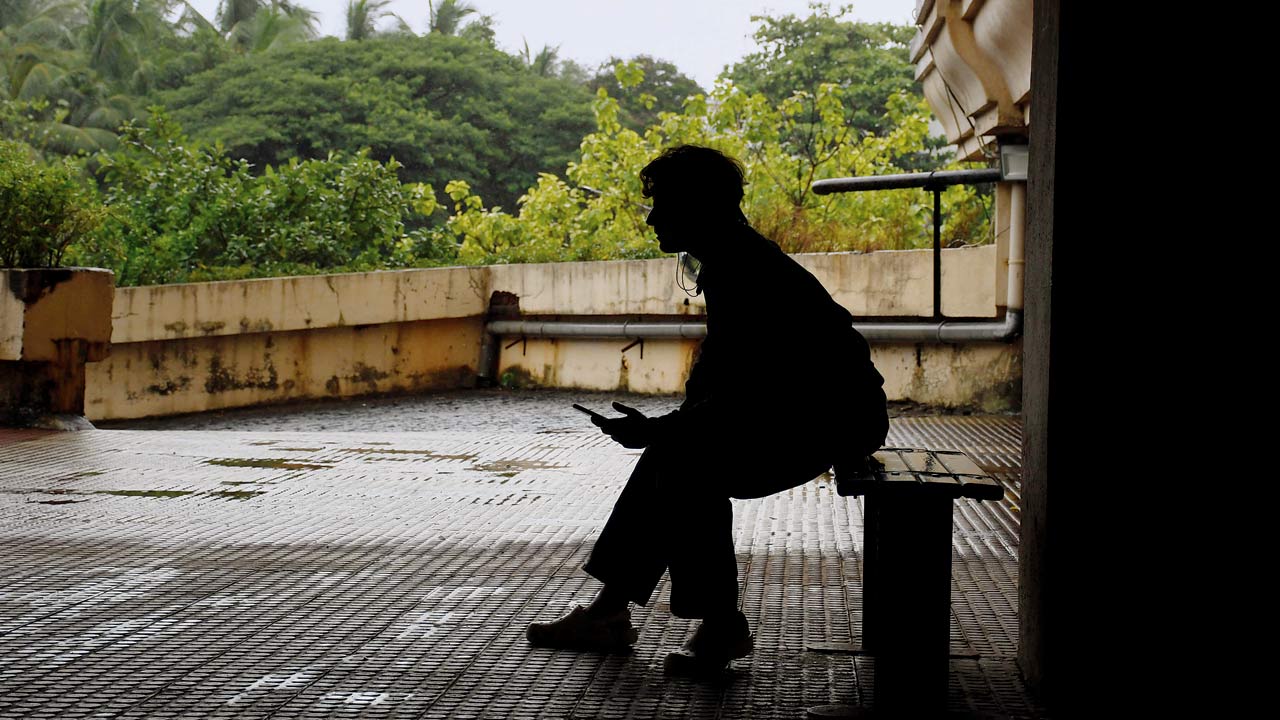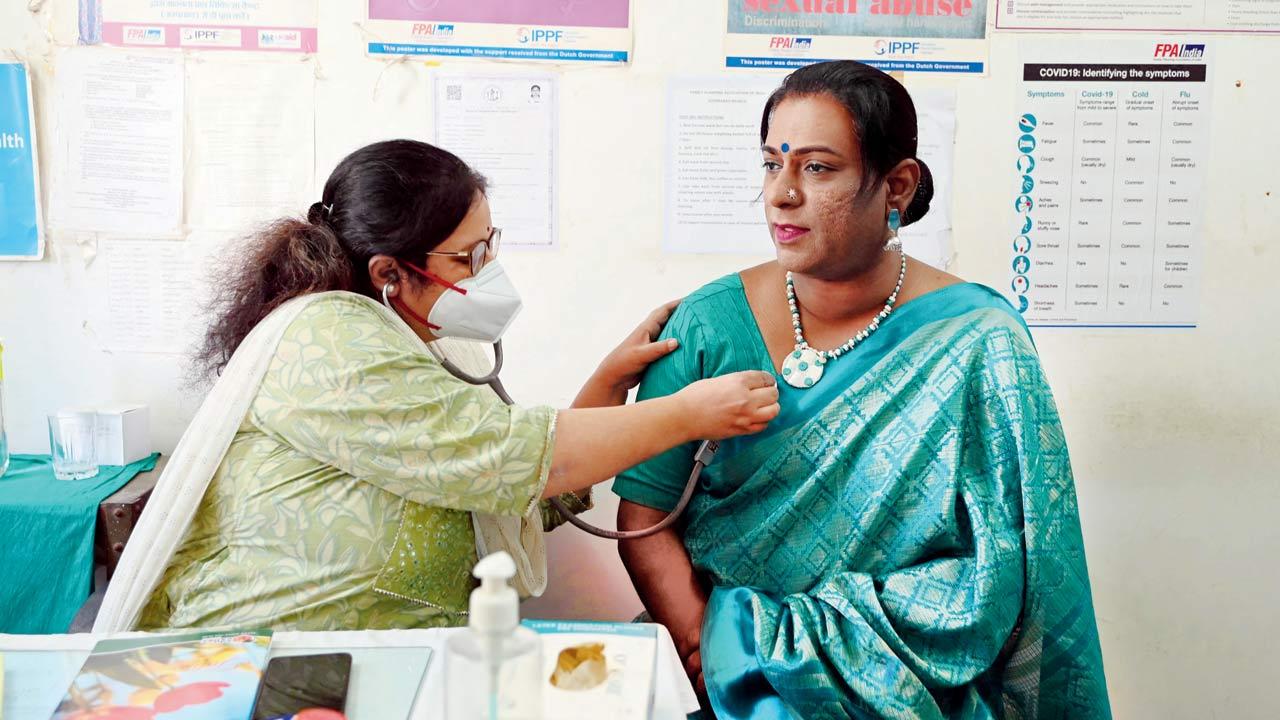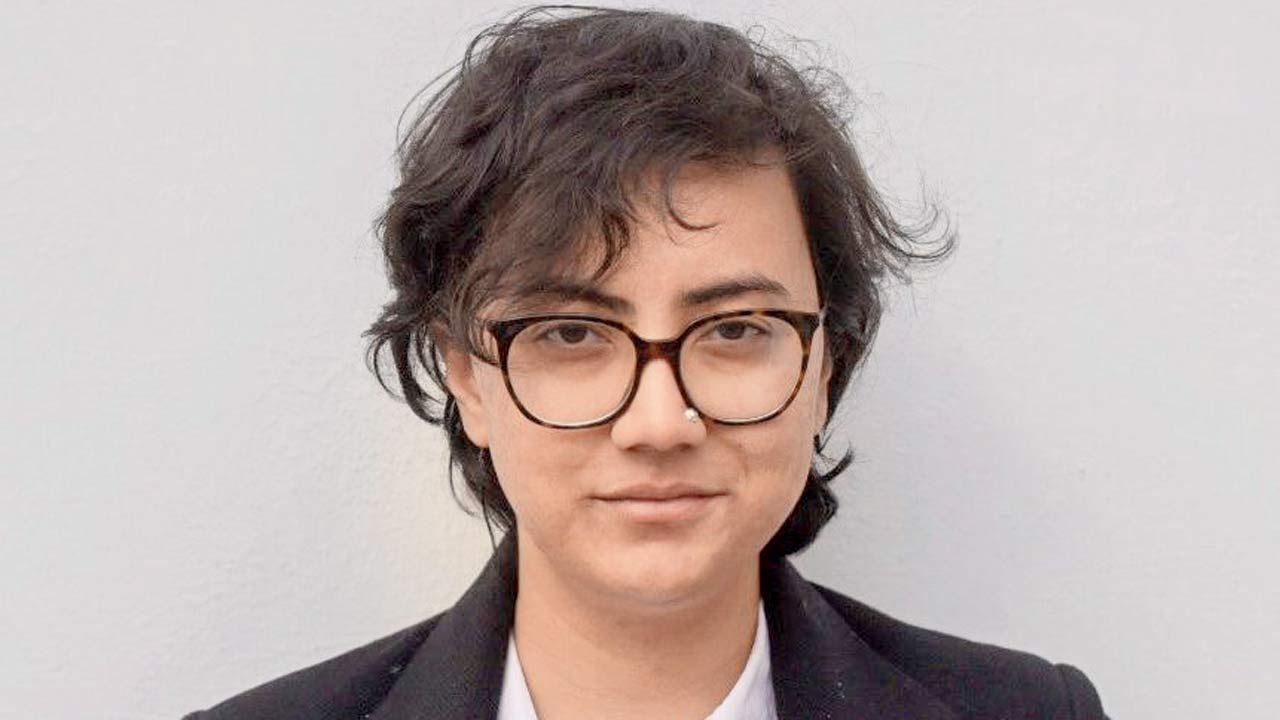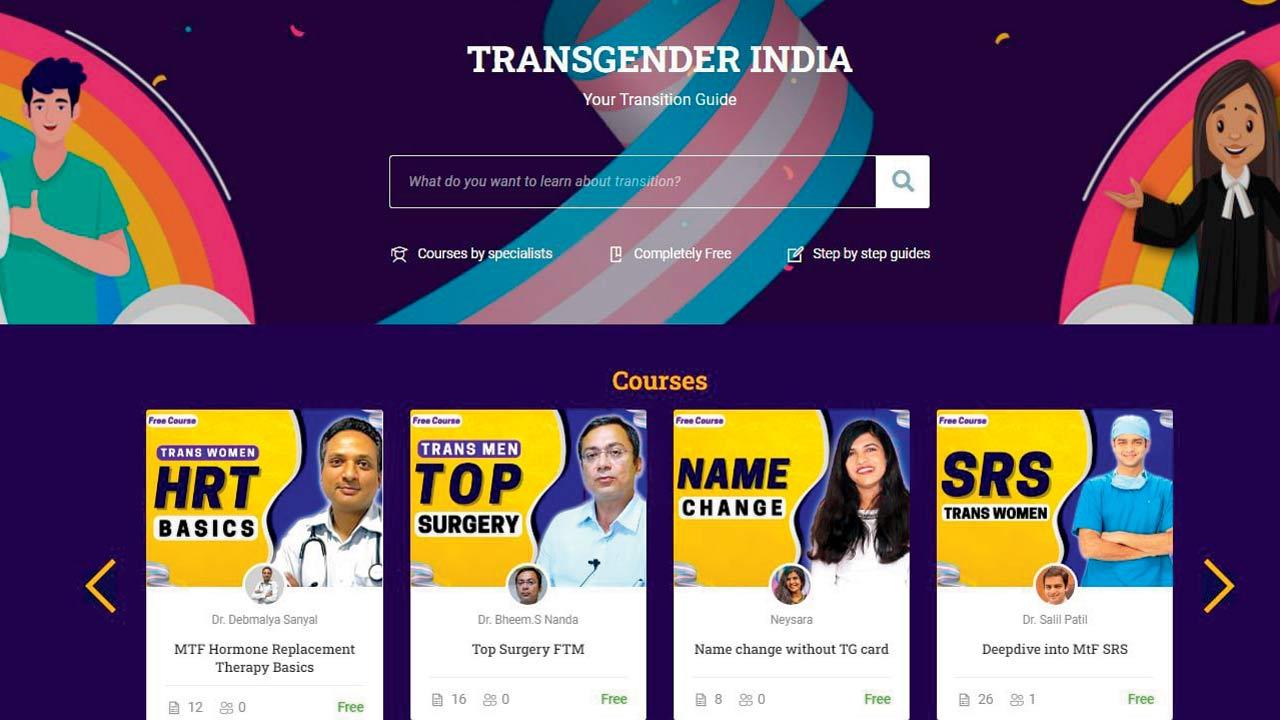A society that shuns hijras and is cautious of trans persons is pushing them to self inject hormones without prescriptions. Their desperation to transition quickly to their gender of choice with no access to cost-effective medical advice means their lives are at risk

Goregaon resident and trans man Saif, who prefers to be identified by his first name only, has been undergoing Gender-Affirming Hormone Therapy (GAHT) since 2020. Finding an endocrinologist he can afford has been his biggest challenge. Pic/Ashish Raje
Twenty four-year-old Nalasopara resident Manas Kulshrestha has been on Gender-Affirming Hormone Therapy (GAHT) for the last three months. The therapy, which involves taking hormone injections or oral medication, helps align the characteristics of the individual with their gender identity. Kulshrestha, who identifies as transmasculine, says that when he decided to begin GAHT, he first consulted an endocrinologist at the civic-run Sion Hospital. “The doctor told me to start with 50 mg of testosterone [primary male sex hormone and anabolic steroid in males] every 15 days.”
His friend, on the other hand, wanted to hasten the transition. “Without consulting a specialist, he decide to inject himself with 250 mg every 15 days,” he says. “That is 500 mg of testosterone per month. He did this for five months and eventually, his kidneys began to shut down. He was admitted to a local hospital, and the doctor had to take him off hormones completely. He can’t take the injections until his kidney values improve,” says Kulshrestha, adding that his friend will now have to restart GAHT all over again.
 A Mumbai-based trans man who has been undergoing Gender Affirming Hormone Therapy, says that self-medication of hormones is become commonplace among trans persons. Pic/Ashish Raje
A Mumbai-based trans man who has been undergoing Gender Affirming Hormone Therapy, says that self-medication of hormones is become commonplace among trans persons. Pic/Ashish Raje
Self-administration of gender-affirming hormones is a common practice within the trans community. According to a 2022 research paper published in the Sexual and Reproductive Health Matters article, which did a systematic review of effectiveness, cost, and values and preferences of end-users opting for GAHT, self-administration of hormones is “more efficient and convenient, offering the possibility of fewer health facility visits; more private; and more empowering, facilitating greater client control over their own bodies and health”. However, it also red flags the increasing incidence of unmonitored self-medication. The research paper in Sexual and Reproductive points to several quantitative studies among transgender and gender-diverse individuals globally, who have “documented reported rates of ‘unprescribed’ hormone use ranging from 11 per cent in Ontario, Canada, nine to 31 per cent in London, United Kingdom, to 49.1 per cent in San Francisco, United States, to 78.7 per cent in Rio de Janeiro, Brazil”. The study doesn’t include figures from India, which in 2011, had 4.48 lakh transgender persons.
“One of the primary reasons for self-medicating is the urgency to transition among trans men,” says Kulshrestha. Many are also fighting gender dysphoria—psychological distress that results from an incongruence between a person’s sex assigned at birth and their gender identity. Though gender dysphoria often begins in childhood, some people may not experience it until after puberty or later. This takes a toll on their emotional and mental health. “With a lot of information now increasingly available on the Internet, they feel empowered to okay to try GAHT unmonitored.”
 The transgender sign on an all gender toilet at a university in Hildesheim, Germany. Unlike in developed countries, India lacks easy access to public toilets for trans persons or those transitioning. Queer activists say one of the reasons for the urgency to transition through self-medication is to tide over this social awkwardness. Pic/Getty Images
The transgender sign on an all gender toilet at a university in Hildesheim, Germany. Unlike in developed countries, India lacks easy access to public toilets for trans persons or those transitioning. Queer activists say one of the reasons for the urgency to transition through self-medication is to tide over this social awkwardness. Pic/Getty Images
The other, and more important reason for self-medication, says 21-year-old Saif, a trans man from Goregaon, is the high consultation fee of endocrinologists. “It’s hard to find an affordable endocrinologist in Mumbai,” says Saif, who wishes to be identified by his first name. He began his transition in 2020, and opted for an online consultation with a doctor from Pune. “I realised that the Pune endocrinologist was charging R900, while the one in Mumbai took R2,000.” He opted for the former, and continues to consult with him.
Saif, who has a Gender Affirmation Surgery scheduled later this month, confesses that GAHT wasn’t easy on him. “When I began taking the injections, I saw that my behaviour was turning aggressive. I would fight with my girlfriend and my father. Anything and everything would trigger me,” he recalls. “When this happened, I would reduce my dosage. My transition has been slow, and I do not want to rush it.”
 A doctor examines a transgender woman at a free clinic for members of the community in Hyderabad earlier this year. Easy access to expert medical opinion at centres such as these can help spread awareness about the dangers of self-prescribed hormone therapy, say activists. Pic/Getty Images
A doctor examines a transgender woman at a free clinic for members of the community in Hyderabad earlier this year. Easy access to expert medical opinion at centres such as these can help spread awareness about the dangers of self-prescribed hormone therapy, say activists. Pic/Getty Images
Many of his trans friends, however are not as patient. “I recently heard that someone was self-medicating without consulting, and started to develop lumps all over his body.” LGBTQiA+ activist Anjali Siroya says that trans men often speed up their transition, because they find it more difficult to navigate social spaces, like public toilets. “They can get a haircut and wear their hair short, yes, but they still have to hide their breasts.”
The easy availability of testosterone injections, and oestrogen and progesterone blockers that come in the form of over-the-counter pills at chemists, means that anyone can self-medicate, says Siroya, 25, who identifies as a trans woman, and works as a capacity building officer at the NGO Humsafar Trust.
 Dr Sakshi Mamgain
Dr Sakshi Mamgain
Siroya says that those who self-medicate receive validation from their peers. This is very common within the hijra community, because there is both, the lack of awareness and limited resources available to them. “They think their friend is taking [therapy], so they’ll take it too. But their friend might have not consulted an endocrinologist either.” There is also another risk—at least one study has suggested that self-injection compared to no injection is associated with increased prevalence of HIV, perhaps due to sharing of needles.
Siroya began her transitioning process three months ago, despite coming out several years earlier. “It was an additional financial burden, and I wanted to do it only when I could afford it,” she confesses. Siryoa spends around R4,000 every two months; this includes oral pills and online consultation with an endocrinologist. She takes seven pills through the day, before and after every meal. “Buying oestrogen blockers at a chemist is a traumatic experience,” says Siroya, as there’s always the looming fear of being judged. She advocates for a social ecosystem where the medical fraternity works closely with trans patients, to make
the process easier.
 LGBTQiA+ activist and trans woman Anjali Siroya says the easy availability of testosterone injections, and oestrogen and progesterone blockers that come in the form of over-the-counter pills at chemists, means that anyone can self-medicate today
LGBTQiA+ activist and trans woman Anjali Siroya says the easy availability of testosterone injections, and oestrogen and progesterone blockers that come in the form of over-the-counter pills at chemists, means that anyone can self-medicate today
According to the American Psychiatric Association (APA), a trans person may pursue multiple domains of gender affirmation, including social affirmation (changing one’s name and pronouns), legal affirmation (changing gender markers on their government-issued documents), medical affirmation (pubertal suppression or gender-affirming hormones), and/or surgical affirmation (vaginoplasty, facial feminisation surgery, breast augmentation, masculine chest reconstruction, etc). Not all trans persons desire all domains of gender affirmation, as these are highly personal decisions. GAHT is an essential part of medical affirmation, and a person is only given a go-ahead for it, once they have a Gender Recognition Certificate (GRC) from a psychiatrist. “We try to identify if the person has any personality disorders or mental health issues that might make it very tough for them to handle the transition,” says Dr Armaan Panday, psychiatrist with the Harmony Psychiatry Clinic Hospital, Chembur. “Apart from that, we also investigate whether the person knows what they are giving their consent to. Only if we feel they are ready [for the transition], we give them the GRC.”
There is however, a whole population that’s skipping this medical intervention entirely.
 Trangender India organises workshops and creates awareness videos on gender transitioning
Trangender India organises workshops and creates awareness videos on gender transitioning
Back in 2006, Mangaluru resident Neysara chose to transition surgically, as the medical community at the time, she says, “was not trans-friendly”. Even the surgery was a mess. After my gender affirming surgery, my body stopped making any oestrogen or testosterone,” she says, adding, “Our sex hormones are very much essential for our bone health, As a result my body weakened and like women who produce less oestrogen with age, I got debilitating osteoporosis. I decided that I will not let this happen to anyone else in the community.” She then founded the gender transition guide, Transgender India in 2016, which today, among other tasks, makes informative videos on GAHT.
The videos address FAQs on transition, and the side-effects involved. Neysara, however, says that it’s not always necessary that the transition be monitored by an endocrinologist. “The pill given to a trans woman is basically a contraceptive that given cis women are prescribed, and the side effects, like the thickening of blood or effects on the liver and kidney, can happen to them as well. It’s also why cis women are advised against taking contraceptives all their lives.”
Neysara says, "Cross gender HRT is quite similar to the Hormonal contraceptive given to cis women by a government rural/urban health center doctor, who is mostly a MBBS graduate. Cis women's body and a trans women's body metabolizes these hormones almost identically, hence the side effects and the complications are the same." Neysara suggests MBBS graduates are perfectly capable for managing cross gender HRT in young and healthy trans patients with no other health co-morbidities. She adds "Endocrinologist is a super specialist doctor in India, most trans people in Tier 2/3 parts of India can't access or afford such doctors. What's most important is that these people get trans health care monitored by a medical doctor, than just self medicate due to inaccessibilty of a Endocrinologist.
 Neysara
Neysara
All MBBS doctors can handle such complications, she says. “Also, many parts of the county, the rural areas and even some tier 2 and 3 cities, may not have an endocrinologist.” She instead suggests that MBBS doctors be trained to handle GAHT-related cases.
Dr Sakshi Mamgain disagrees. “I do believe that GAHT has to be done safely and with the supervision of an endocrinologist.” Mamgain, who identifies as queer and non-binary, started the United for Transgender Health (UTH) in Dehradun in 2020, to create a repository of queer-affirmative healthcare providers across India. “When I was pursuing an MBBS degree, there was nothing in the curriculum that taught us to deal with a trans person’s transition,” she says, adding, “Our effort at UTH, is to try and bring queer-friendly doctors together and provide healthcare options throughout the country with partners in various cities.”

Manas Kulshrestha, who identifies as transmasculine, has been consulting an endocrinologist for prescription of the dosage for Gender-Affirming Hormone Therapy
Last year, a one-of-its-kind study titled Hormone Concentrations in Transgender Women Who Self-Prescribe Gender Affirming Hormone Therapy, published in the International Society for Sexual Medicine, looked at the GAHT regimen in Thai transgender women who self-prescribe. The study was based on 527 records of transgender women taking GAHT who were receiving care at a community health centre between January 1, 2018, and December 31, 2020. The study concluded that the regimen was not effective to decrease testosterone concentrations. “A vast majority of Thai transgender women [who self-prescribed] did not have sex hormone concentrations in the recommended range, which could have long-term safety implications on their health,” the study stated.
Dr Dheeraj Kapoor, head of endocrinology, Kokilaben Dhirubhai Ambani Hospital, insists that monitoring of GAHT is a healthy practice. For instance, when a person is transitioning from female to male, they have to undergo psychiatric assessment,. “After that, we go from weekly to a two-weekly or even tri-weekly testosterone injection. We do a blood test periodically, to make sure that the blood hasn’t thickened and adjust the dose accordingly. When blood does thicken it often leads to blood clotting and lead to health complications like a dysfunctional liver,” he says.. Most trans persons, he says, are aware about the side-effects of using injections and oral pills—aggression, migraine, thickening of blood, heart failure, excess potassium in the bloodstream—and are largely cautious. “But there are those who put themselves at risk when self-medicating,” he says, adding, “One of my patients transitioning to a woman took three times the dosage per day than was prescribed. The person had a stroke. She is doing fine now, but people have to understand that the process takes time—sometimes between six to 12 months.”
“There’s very little research or information about trans health in the country, and that’s leading to a lot of misinformation within the trans community. We need a more research-oriented approach towards trans health, and how community members can be engaged to bring about more awareness,” says Mamgain of UTH. “Also, considering primary healthcare centres are the first point of contact for anyone, it’s important to equip, train and sensitise doctors to understand the needs of the LGBTQiA+.” She feels that the way health professionals see and treat trans persons, will play an important role in how they see themselves.
“It will help ease them through their transition.”
50 mg
Testosterone injections prescribed fortnightly in the initial stages of the female-to-male transition
4.48L
No. of transgender persons in the country, according to the 2011 Census of India
 Subscribe today by clicking the link and stay updated with the latest news!" Click here!
Subscribe today by clicking the link and stay updated with the latest news!" Click here!











